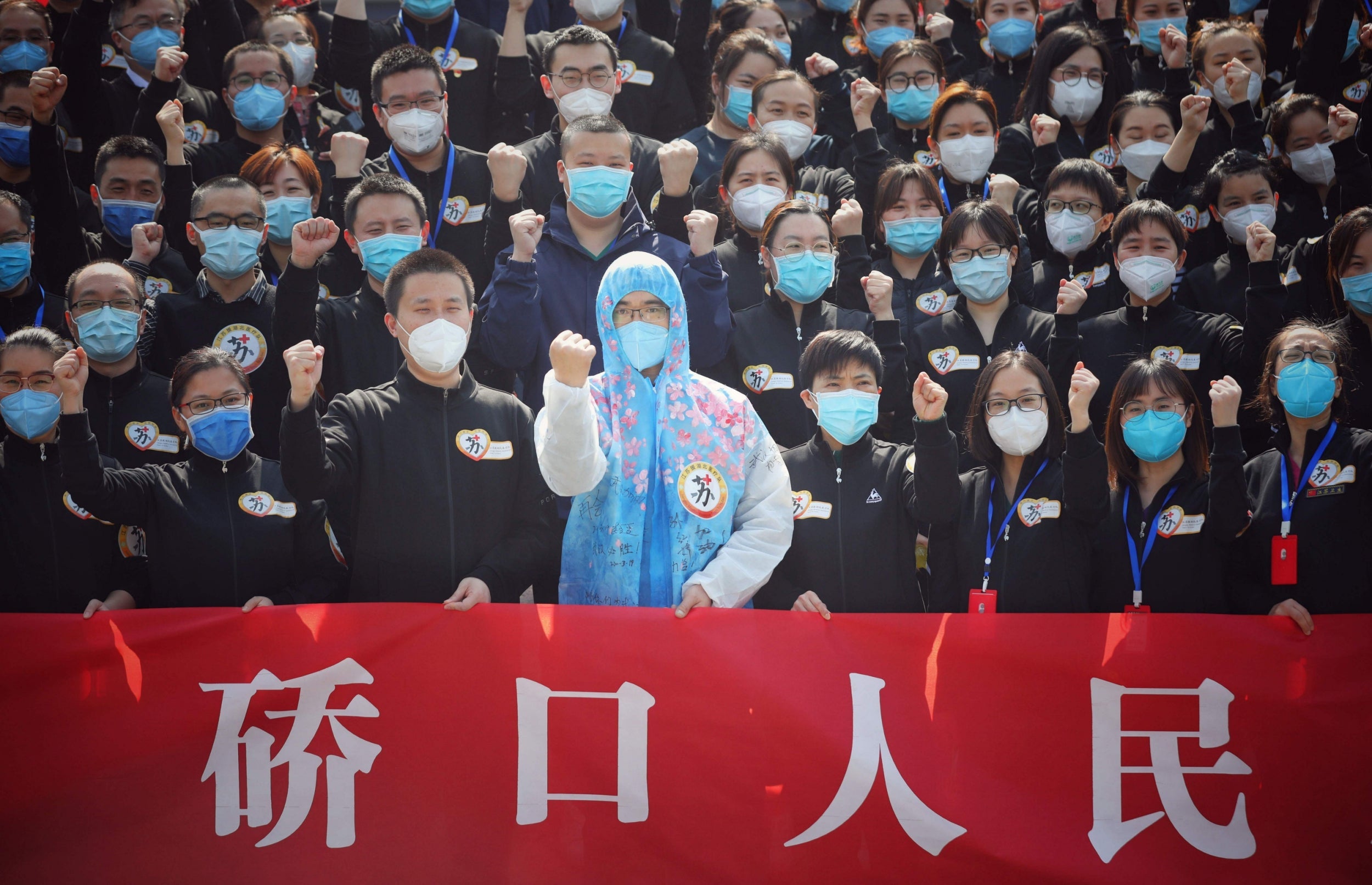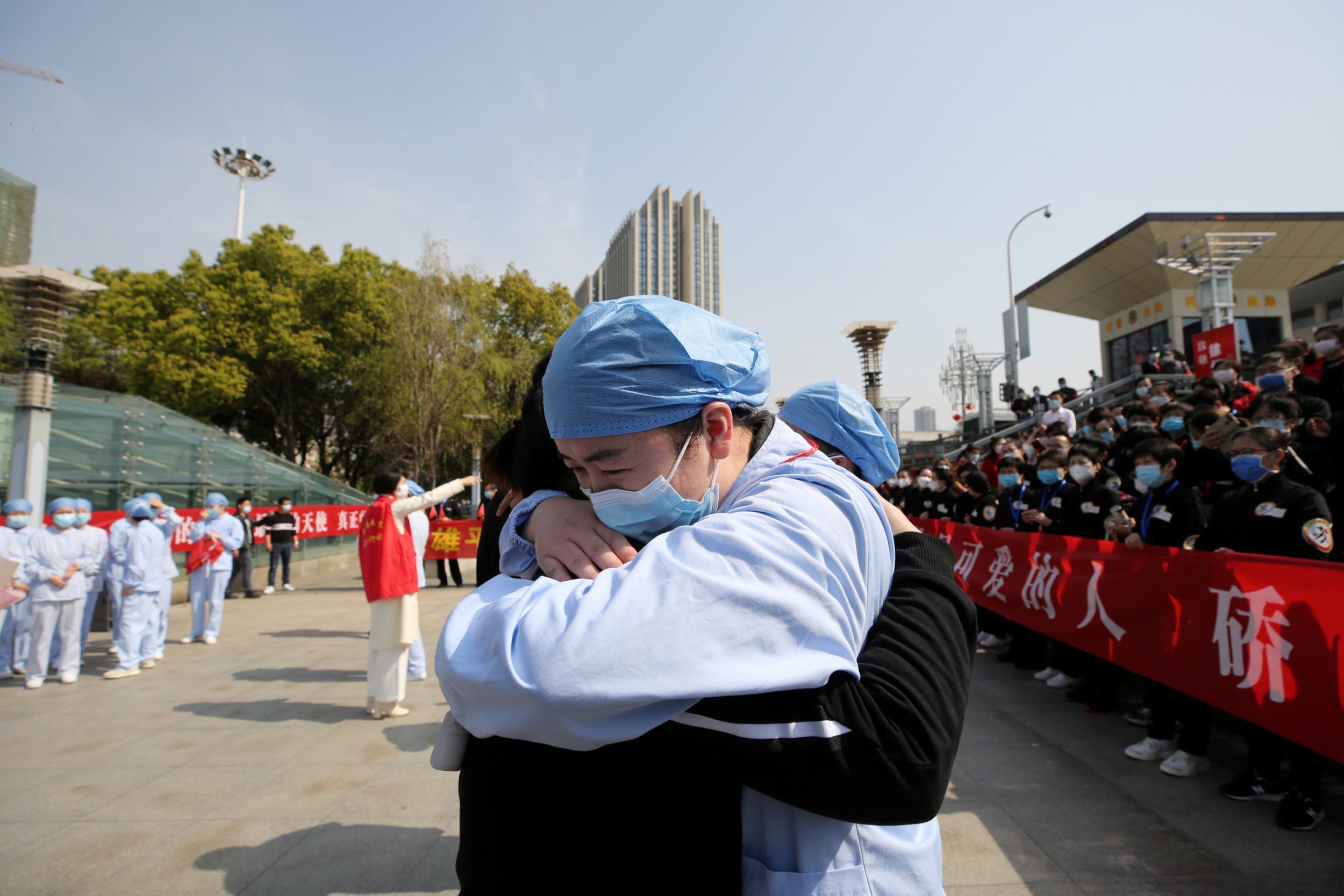Coronavirus: Xi Jinping pledges to help at-risk regions as China’s virus cases dwindle
‘European solidarity does not exist. I believe in my brother and friend Xi Jinping, and I believe in Chinese help,’ says Serbian leader
Your support helps us to tell the story
From reproductive rights to climate change to Big Tech, The Independent is on the ground when the story is developing. Whether it's investigating the financials of Elon Musk's pro-Trump PAC or producing our latest documentary, 'The A Word', which shines a light on the American women fighting for reproductive rights, we know how important it is to parse out the facts from the messaging.
At such a critical moment in US history, we need reporters on the ground. Your donation allows us to keep sending journalists to speak to both sides of the story.
The Independent is trusted by Americans across the entire political spectrum. And unlike many other quality news outlets, we choose not to lock Americans out of our reporting and analysis with paywalls. We believe quality journalism should be available to everyone, paid for by those who can afford it.
Your support makes all the difference.China’s leader, Xi Jinping, pledged to send more medical experts to Italy this week, on the same day Beijing sent 2,000 rapid diagnostic tests to the Philippines. Serbia’s president pleaded for assistance not from the country’s neighbours in Europe, which restricted the export of needed medical equipment, but from China.
“European solidarity does not exist,” the Serbian leader, Aleksandar Vucic, said when he announced a state of emergency in televised remarks. “That was a fairy tale on paper. I believe in my brother and friend Xi Jinping, and I believe in Chinese help.”
Only a few weeks ago, China was overwhelmed by the coronavirus epidemic that began in the central Chinese city of Wuhan, accepting donations of masks and other medical supplies from nearly 80 nations and 10 international organisations.
Now, with new daily cases at home dwindling into the single digits, China is mounting a diplomatic offensive to help, as the rest of the world struggles to get the virus under control. From Japan to Iraq, Spain to Peru, it has provided or pledged humanitarian assistance in the form of donations or medical expertise — an aid blitz that is giving China the chance to reposition itself not as the authoritarian incubator of a pandemic but as a responsible global leader at a moment of worldwide crisis.
In doing so, it has stepped into a role that the West once dominated in times of natural disaster or public health emergency and that President Donald Trump has increasingly ceded in his “America First” retreat from international engagement.
“This could be the first major global crisis in decades without meaningful US leadership and with significant Chinese leadership,” said Rush Doshi, director of the China Strategy Initiative at the Brookings Institution in Washington.
He noted that only a few years ago the United States led the fight against Ebola.
The outbreak that started in Wuhan, which has infected nearly 200,000 people and killed nearly 8,000 worldwide, has been a staggering setback for Mr Jinping’s leadership, fanning discontent at home and questions abroad about the efficacy of the Communist state.
Now, the global failures in confronting the pandemic from Europe to the United States have given the Chinese leadership a platform to prove its model works — and potentially gain some lasting geopolitical currency.
As it has done in the past, the Chinese state is using its extensive tools and deep pockets to build partnerships around the world, relying on trade, investments and, in this case, an advantageous position as the world’s largest maker of medicines and protective masks. The largess is going a long way to help temper popular anger over its initial mishandling of the outbreak that is now wreaking havoc on every continent bar Antarctica.

“I don’t know and now I don’t care,” Michele Geraci, a former undersecretary in the Italian economic development ministry, said in an interview when asked if the assistance reflected China’s geopolitical ambitions as much as humanitarian concerns.
He said the urgent issue was to provide aid to save lives, something that Italy’s allies in the European Union had been unable or unwilling to do.
“If somebody is worried China is doing too much, the gap is open to other countries,” he said. “This is what other countries should do.”
China has long aspired to assert a more prominent role in the United Nations and other international organisations while projecting its political, economic and military influence in more and more parts of the world — at times in direct competition with the United States.
“China is now trying to repair its severely damaged international image due to its mishandling of the outbreak in Wuhan in early January,” Minxin Pei, a professor of government at Claremont McKenna College in California, wrote in an email.
“Donating medical supplies shows China is a responsible and generous world power,” he added. “It is also touting its success in containing the coronavirus outbreak to suggest its one-party regime is superior to the bumbling democracies in the West, in particular the U.S.”
On Wednesday, China said it would provide 2 million surgical masks, 200,000 advanced masks and 50,000 testing kits to Europe. “We’re grateful for China’s support,” Ursula von der Leyen, the president of the European Commission, said in a tweet. “We need each other’s support in times of need.”
One of China’s leading entrepreneurs, Jack Ma, offered to donate 500,000 tests and 1 million masks to the United States, where hospitals are facing shortages despite having weeks of notice to prepare. In February, the United States flew in 17 tons of supplies to Wuhan aboard four flights that evacuated Americans from the city.
“This is no longer a challenge that a country can solve on its own, but it requires all of us to work together,” Ma’s foundation said in a statement that listed donations to dozens of countries, including all 54 nations in Africa.
The statement went on to cite Ma’s use on Weibo, a social media platform, of a familiar phrase in the American political lexicon: “United we stand, divided we fall.”
Chinese officials have insisted that a pandemic should be an arena for political cooperation, not competition. China’s success in slowing the disease’s spread, however, has emboldened officials and state media to push back harder — at times clumsily.
One foreign ministry spokesman, Zhao Lijian, floated a conspiracy theory that the US Army was behind the virus, while another squabbled with Mario Vargas Llosa, the Peruvian author and Nobel Prize laureate, over a newspaper column he wrote about the pandemic.
China’s critics dismiss the assistance as hollow gestures, even cynical ones.

Many in Italy, for example, angrily pointed out that China was selling masks, respirators and other medical equipment, not donating them, and claimed that some of the materials were meant for Chinese citizens in the country.
Others have warned that China was using its dominant role in the production of respirators and masks to reward friendly nations. China made half the world’s masks before the coronavirus emerged there and it has greatly expanded production nearly 12-fold since then, although it has kept more of the supply for itself.
Li Xingqian, the director of international trade at the commerce ministry in Beijing, said in a recent briefing that the government had not issued any rule to stop exports, but simply needed to meet strong domestic demand for masks and other protective equipment.
For countries on the receiving end of China’s largess, questions about the country’s motives have largely taken a back seat. That has been especially clear in Iraq, a country that has been a focus of U.S. foreign policy for decades.
Ten days ago, a team of seven Chinese medical experts stepped off an Iraqi Airlines plane in Baghdad bearing medical equipment and supplies. Those included two machines that will allow Iraqi lab technicians to more than quadruple the number of coronavirus tests they do every day, according to doctors dealing with the outbreak.
“The Iraqi people value this initiative of the Chinese people,” Jassim Al-Falahi, the deputy minister of health, said as he met the arriving team.
In the days since the Chinese experts have begun to brief doctors and health officials about steps to combat the coronavirus, conducting some discussions by teleconference with Iraqi hospital leaders, according to Dr Hassan Al-Tamimi, the director-general of Baghdad’s Medical City Teaching Hospital Complex.
A statement by the Iraqi foreign ministry made clear that the coronavirus was only one of the projects the two countries would be working on together: the others include the oil industry and updating some of Iraq’s ageing electricity infrastructure.
It is not clear whether the Iraqis fully absorbed the lessons the Chinese have offered. At a signing ceremony on Tuesday for the installation of a new lab at Medical City, the Chinese ambassador to Iraq, Zhang Tao, appeared visibly anxious.
“Really, there are many people in this room, important people, government advisers and ministers, none of them is wearing a mask or gloves,” Zhang told Mohammed Waheen, a pulmonologist at Medical City Teaching Hospital, who also attended.
“Your prime minister is more than 70 years old,” Waheeb said, recalling his conversation with the ambassador. “You are not taking this seriously.”
New York Times

Join our commenting forum
Join thought-provoking conversations, follow other Independent readers and see their replies
Comments